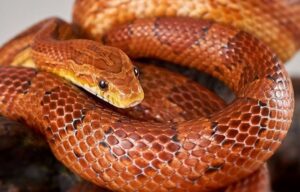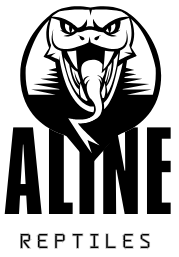If you’re considering adopting a pet snake or are simply curious about these fascinating creatures, you may have stumbled upon the question, “Are corn snakes venomous?” It’s a common concern among snake enthusiasts and prospective pet owners, especially when people hear the word “snake” and immediately associate it with danger.
But here’s the good news: corn snakes are non-venomous and incredibly safe to handle, making them one of the best choices for first-time snake owners. In this guide, we’ll dive deep into why corn snakes are safe, their behaviors, and how to care for them, so you can make an informed decision about keeping one as a pet.
Whether you’re new to the world of reptiles or a seasoned snake lover, this article is packed with the information you need.
What Are Corn Snakes?

Corn snakes, scientifically known as Pantherophis guttatus, are a species of rat snake native to North America. They get their name from the pattern on their scales, which resemble the colors and texture of Indian corn. These snakes are typically found in the southeastern United States, but they are also popular as pets due to their calm nature, vibrant coloration, and ease of care.
Corn snakes are relatively small, growing to lengths of about 4 to 5 feet (though some can grow longer), and they have a slender build. Their skin boasts a wide variety of colors, ranging from shades of orange, red, brown, and black, often adorned with beautiful patterns that resemble blotches or stripes. These patterns help them blend into their environment, providing camouflage as they hunt for small mammals, birds, and lizards in the wild.
What sets corn snakes apart from other species is their non-aggressive nature. They are known for their docile temperament, making them excellent pets for beginners and experienced reptile keepers alike. This calm behavior, along with their non-venomous status, has made them one of the most sought-after snakes in the pet industry.
Understanding Venomous vs. Non-Venomous Snakes
Before diving into the question of whether corn snakes are venomous, it’s important to understand what venomous means in the context of snakes.
A venomous snake is one that produces venom, a toxic substance used to immobilize and digest its prey. Venom is typically injected into the prey through fangs, and it can be deadly to smaller animals (and sometimes humans). Venomous snakes often use their venom to hunt and protect themselves from predators.
On the other hand, non-venomous snakes do not produce venom. Instead, these snakes rely on other methods to capture and kill their prey. The most common technique used by non-venomous snakes, like corn snakes, is constriction. When a corn snake captures its prey, it wraps its body around the animal and squeezes tightly, cutting off blood flow and suffocating the prey. This is a safe and effective way for them to feed without needing venom.
Some of the most well-known venomous snakes include cobras, vipers, and rattlesnakes. Non-venomous snakes, such as corn snakes, garter snakes, and ball pythons, are harmless to humans and rely on constriction to subdue their prey.
Are Corn Snakes Venomous?
Now, to answer the burning question once and for all: Are corn snakes venomous? The short answer is no, corn snakes are not venomous.
Unlike venomous snakes that inject venom through their fangs to kill prey, corn snakes rely on constriction. When a corn snake captures its prey—usually small rodents like mice, birds, and lizards—it will coil its body around the animal and squeeze, cutting off blood flow and suffocating it. This method is highly effective and poses no risk to humans or other pets.
The misconception that corn snakes might be venomous may arise from their appearance. Some people confuse them with venomous species like copperheads or coral snakes, which share similar coloration or patterning. However, despite their appearance, corn snakes are completely harmless and pose no threat to humans.
What Happens If a Corn Snake Bites You?
While corn snakes are non-venomous, it’s still possible for them to bite. However, bites from corn snakes are very rare and typically occur when the snake feels threatened or stressed. If a corn snake does bite, it’s usually because it feels frightened, startled, or confused. A bite from a corn snake might hurt, but it is generally harmless.
The bite will feel like a small pinch or scratch, and while it might draw a bit of blood, the wound will typically heal quickly without any long-term effects. If you’re bitten by a corn snake, here’s what you should do:
- Clean the wound with warm water and mild soap to prevent any bacteria from entering.
- Apply an antiseptic to the bite area.
- Cover the bite with a clean bandage to avoid infection.
Although the bite is usually harmless, it’s important to handle your corn snake gently and with care to avoid triggering any stress or defensive behavior.
Are Corn Snakes Dangerous to Humans?
The thought of keeping a snake as a pet may make some people nervous, especially if they’re unfamiliar with reptiles. However, corn snakes are not dangerous to humans. Their calm and docile nature makes them ideal pets for both beginners and experienced snake enthusiasts.
Corn snakes don’t have the venomous fangs that would make them a risk to humans. They are generally very gentle and can be handled with care. In fact, they are one of the least aggressive snake species, which makes them perfect for first-time snake owners or families with children.
Unlike some other species of snakes, corn snakes rarely bite unless they feel threatened. If they do bite, it’s typically out of fear or confusion, not aggression. To ensure safe handling, always support the snake’s body fully and avoid making any sudden movements that might startle it. With proper handling, corn snakes will likely remain calm and enjoy their interactions with you.
Benefits of Keeping Corn Snakes as Pets

There are many reasons why corn snakes make excellent pets. Let’s take a look at some of the benefits of owning a corn snake:
- Low-Maintenance: Corn snakes are relatively easy to care for. They don’t require daily attention like some pets, and they thrive in simple, well-maintained enclosures. They only need to be fed once every 5 to 7 days and don’t need constant social interaction.
- Docile Nature: Corn snakes are known for their calm temperament. They are less likely to bite than other snakes and can be handled gently without fear of aggression. This makes them ideal for beginners or families with children who want to interact with a snake.
- Beautiful Appearance: Corn snakes are visually stunning with their bright colors and intricate patterns. They come in a variety of colors, including shades of orange, red, and brown, and some even have unique albino or pastel variations.
- Non-Venomous: As we’ve already established, corn snakes are non-venomous. This makes them a safe option for those who might be worried about the dangers of venomous snakes.
- Good Size for Home: Corn snakes are generally small to medium-sized snakes, usually measuring between 4 to 5 feet in length. They don’t require enormous enclosures like some larger snakes, making them perfect for people living in apartments or homes with limited space.
How to Safely Handle and Care for a Corn Snake
While corn snakes are generally easy to care for, it’s important to provide them with the right environment and handle them properly. Here are some tips for safely caring for your corn snake:
- Proper Housing: Corn snakes require a secure enclosure, such as a glass tank or plastic terrarium, with a lid to prevent escape. The enclosure should be large enough to allow the snake to move around comfortably. A 20- to 40-gallon tank is ideal for most adult corn snakes.
- Temperature and Humidity: Corn snakes are ectothermic, meaning they rely on their environment to regulate their body temperature. The enclosure should have a temperature gradient, with a warm side (around 85°F) and a cool side (around 75°F). A humidity level of 40-60% is ideal.
- Feeding: Corn snakes are carnivores and eat small rodents like mice or rats. Juvenile corn snakes should be fed smaller prey, while adults can eat larger meals. It’s important to feed your snake appropriately sized prey to avoid overfeeding or underfeeding.
- Handling: To avoid stressing your corn snake, handle it gently and calmly. Support the snake’s entire body and avoid sudden, jerky movements. Don’t try to grab it by the tail or squeeze it too tightly.
Conclusion
Corn snakes are not venomous and are among the safest and easiest snakes to keep as pets. Their non-aggressive behavior, coupled with their striking appearance and low-maintenance care, makes them a fantastic choice for both beginner and experienced snake owners.
Whether you’re a reptile enthusiast or just considering a snake as a pet, the corn snake’s calm nature and safety as a non-venomous species make it a great addition to any home. With proper care, a corn snake can thrive and become a beautiful, long-term companion.

